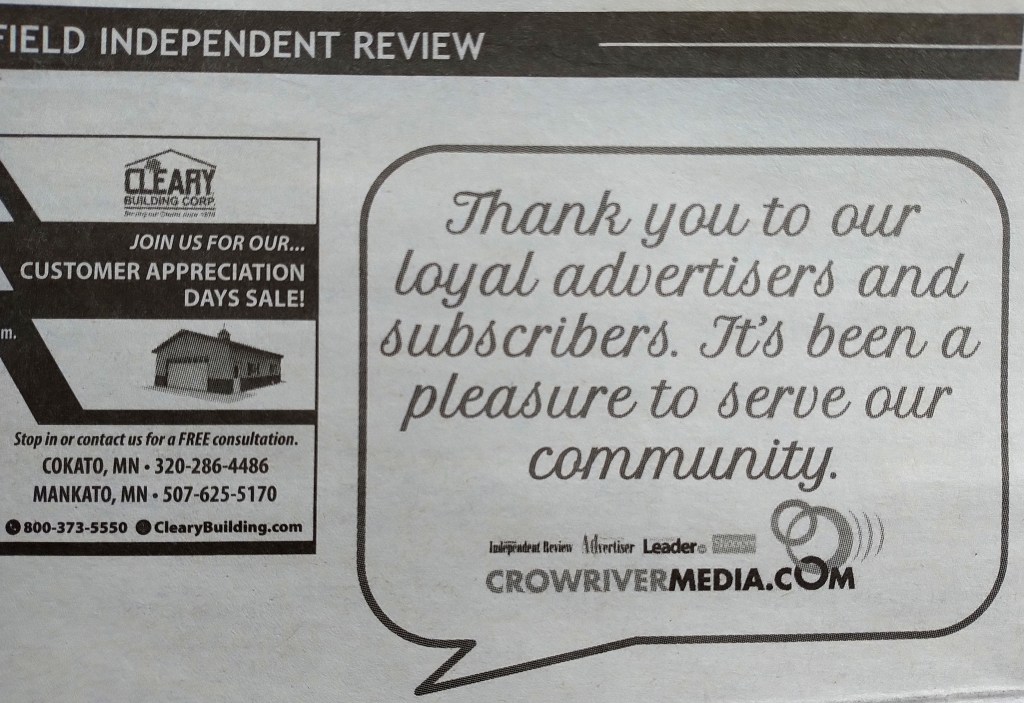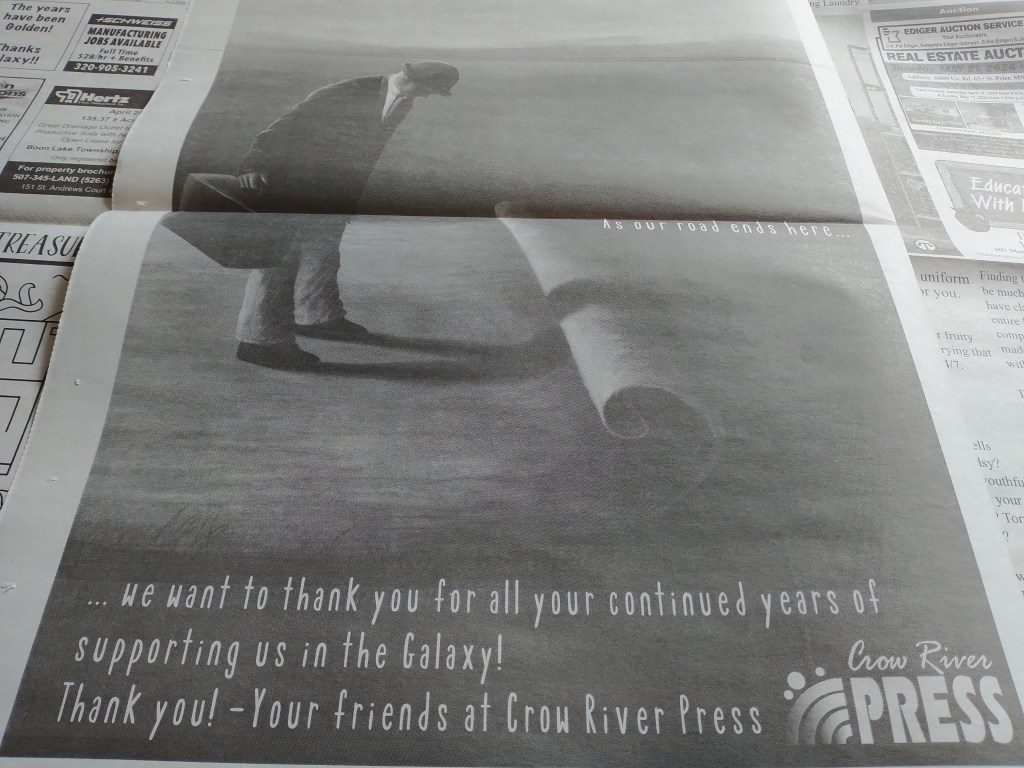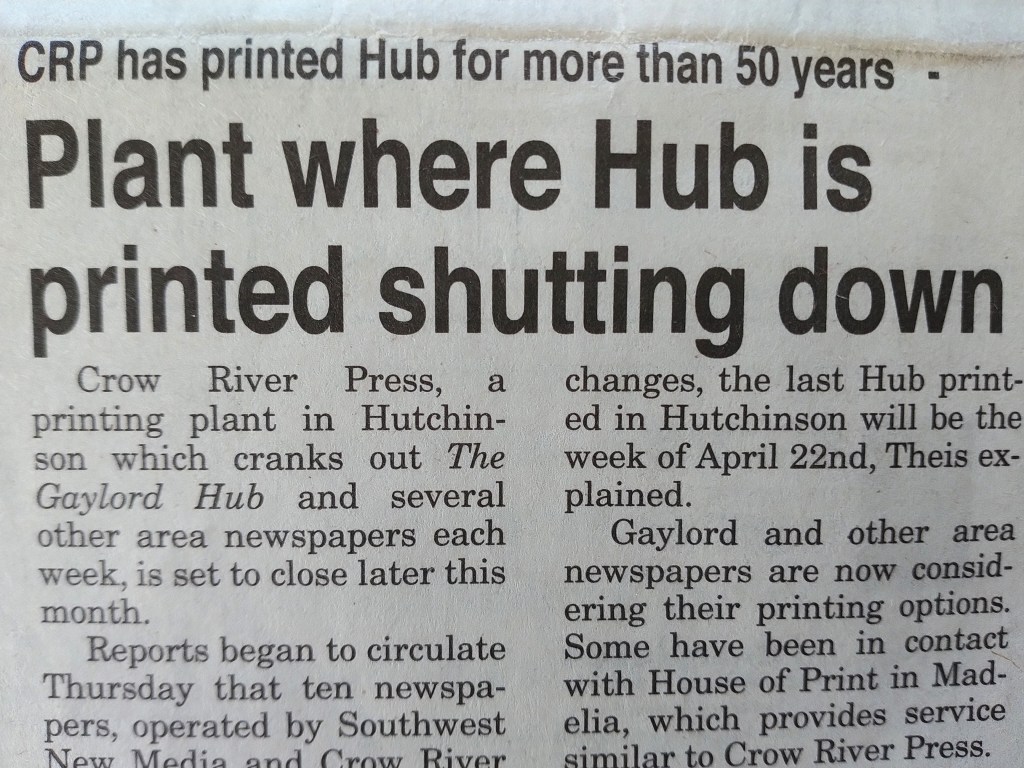THE LOSS IS IMMENSE, TRAGIC—the deaths of eight prominent community members in southern Minnesota last week. I knew none of them personally. Yet I did. We all did.
If you have ever read a community newspaper, then you knew the deceased. For it is eight Minnesota newspapers, not individuals, that died. Ceased publication, only weeks after an announcement of their forthcoming funerals.
I am mourning the deaths of the Hutchinson Leader, Litchfield Independent Review, Chaska Herald, Chanhassen Villager, Jordan Independent, Shakopee Valley News, Prior Lake American and Savage Pacer, plus Crow River Press Printing Plant. All are owned by Denver-based MediaNews Group, part of hedge fund Alden Global Capital.
They ranged in age from 30 (Savage Pacer) to 162 (the Chaska and Shakopee papers). Five of the eight began publication between 1862-1880. That’s quite a legacy.
I am undeniably biased in reporting this news. I hold a journalism degree, have worked for community newspapers and write for publications owned by Adams Publishing Group. I believe in community journalism with the fierceness of recognizing its importance, its value, to the people who live and work in the places these papers cover. No one covers local like local.

And now that print coverage is lost in all these southern Minnesota towns, cities and rural areas: The watchdog coverage of school board, city council, county board, planning and zoning, and other government bodies. The stories about crime and tragedies. The stories about community events and celebrations. The interesting features that focus on people. Local sports and arts and entertainment stories. Community calendars, school honor rolls and lunch menus. Graduation. Obituaries and much more.
In my first journalism class at Minnesota State University, Mankato, I learned how to craft an obituary. It was our initial writing assignment, I think to impress upon all of us post-Watergate would-be reporters the importance of getting every detail correct in a story. That lesson stuck with me. Get it right.
I took that knowledge with me to The Gaylord Hub, a small town community newspaper printed at Crow River Press in Hutchinson. Each week a co-worker and I aimed north in a vintage Dodge van to deliver the newspaper lay-out sheets to the printing plant. The process of creating a newspaper in 1978 was decidedly different than today. Consider that I typed all my stories on a manual typewriter. A typesetter then typed my work into a typesetting machine. Stories were printed out in columns, then laid out and pasted onto lay-out sheets. No designing by computer. Then it was off to Crow River Press, where a co-worker and I watched the Hub roll off the press, bagged the freshly-inked papers and delivered them to the Gaylord Post Office, where subscribers eagerly waited to get their papers.
Yes, I’m feeling a tad nostalgic and sad thinking of the closure of Crow River Press. The recent shut-down left the publisher of The Gaylord Hub, and other small town newspaper owners, scrambling for a place to print their papers. Many printing plants, like community papers, have met their demise in Minnesota as large media groups acquired papers and plants.

Times change. I understand that. The economy, technology, COVID, acquisitions and much more have factored into the deaths of community newspapers. Readers find their “news” elsewhere. Businesses spend their advertising dollars elsewhere. Far-removed executives make questionable business decisions. The list of reasons and excuses and explanations is extensive.
Community members, too, hold some responsibility in the deaths of newspapers. I can’t speak to the specific papers that closed last week in Minnesota, but I can tell you what I hear locally. And that is criticism, some deserved, much not. People have always criticized the media, failing to remember that reporters are reporting, not creating, the news. But the comments have become more intense, more rabid, more frequent. Freedom of the press feels threatened in our democracy.
The community journalists I know are honest, hardworking, (probably) underpaid and devoted to the craft. Just as I was when I worked as a full-time newspaper reporter.

Community newspapers are no longer valued like they once were, resulting in fewer subscribers. When I hear people say they no longer subscribe to the local paper, I suggest they reconsider. Community newspapers are vital to our cities, towns and rural areas. And sometimes we don’t understand that, until it’s too late, until we’re reading their obituaries.
-30-
NOTE: Print journalists have used -30- to signify the end of a story submitted for editing. I use # to indicate the ends of my stories, except today, when the old school -30- seems more appropriate.
© Copyright 2024 Audrey Kletscher Helbling




I feel your pain. 😪 I felt the same way when our small town actual paper newspaper in Southern Oregon shutdown last year. I’d contributed several outdoor-oriented stories to it over the years and it was always a little thrill to see my work in print on paper. A new, mostly digital, newspaper is trying to take its place but that’s just not the same.
Digital is definitely not the same. I hope people realize the value of local journalism, emphasis on LOCAL. I’m sorry your small town in Oregon lost its paper.
Most likely when you completed your obituary writing instruction in a college journalism course, you never dreamed you would write one about the loss of eight community newspapers. How things change. This loss is truly sad for so many communities. Your obituary post is a heartfelt expression of that loss and a tribute to the value of these local newspapers had. Yes, I recall -30- in my early newspaper career. It always felt good to get to that ending.
Bernadette, as a former journalist, you understand. You could have written this piece as easily as me. I mourn the loss of so many community newspapers, not just these eight.
So true, there are hundreds, maybe more, across the country.
That’s right, unfortunately.
this is a devastating loss for the community and has happened way too much. I loved the local print editions of my paper, it felt like home
I like that the print editions of your community newspaper “felt like home.” That is such a spot on description of local.
How can we keep our newspapers running though. What is our plan to keep print viable? We need local news for sure from GOOD reporters and journalists but how to we support them.
You ask a good question, Cecilia. First, subscribe to the paper. If you’re a business, advertise. Compliment a reporter (be specific); often the only thing they hear is criticism. Let the editor know how much you value your local paper and journalists, again in specific ways. Whenever you have an opportunity to say something good about the local paper to others, do so. Those are my off-the-top-of-my-head suggestions.
And very good suggestions they are. Thank you.
You are welcome, C.
You bring attention to what’s happening to small town newspapers. You are so right about how important coverage of school boards, county and city government, and local issues is. In my area of deep southwestern Minnesota, a local publisher of four papers recently combined two of them. I’m guessing he couldn’t afford to replace a recent retiree who did so much; reporting, photography, ads, etc. Or maybe he couldn’t find anyone qualified. The resulting paper isn’t good. It seems like they haven’t taken the time to figure out a way to organize the pages into something logical for two communities who have long been rivals. But, they are trying so maybe it will develop with time. Another regional paper, the Worthington Daily Globe, was bought up by a big news service but still has a print paper once a week plus a digital editions. Fortunately, they have been able to retain local coverage, but the loss of that daily printed paper was huge for so many in the area.
Young journalists today likely don’t want to work the long and odd hours we “older” reporters did. So, yes, I understand the challenge your local publisher faced. It’s good that he’s trying to make things work and I hope he does. The public and businesses need to support him via subscriptions and advertising. I’m thankful the Globe covers your area, too.
I’m thankful you still have a local paper, even if coverage is more spread out. And I’m thankful the Globe also provides coverage.
This is so sad. All the local history events and color that doesn’t get covered. And the cost! I would like to take FDN, just can’t justify it when the SPP is costly as well. Pro’s like you need to carry the banner! Thank you!
I understand the cost limitations for those of us on limited incomes.
I always find it terribly sad when a local paper ‘dies’. Years ago, I worked at our local newspaper as an ad assistant/typesetter/proofreader. It’s not easy to keep local papers running, everyone in the office wears many hats. Our small-town offices moved mostly into the next bigger town, where they still publish our ‘local’ paper. For us old-school, tactile readers the digital sites are not the same, they’re less personal and all seem to run the same format. It doesn’t matter what local town paper you’re reading online; all the news websites look the same.
I’m definitely old school in liking a newspaper in my hands. Something I can pick up easily and read. Something I can clip stories from. Something that feels authentic. You’re right on small town newspaper employees wearing many hats. I’ve been one of those people wearing many hats.
Hi Audrey, Tom Weaver native of Faribault.Thanks for the thread of the disappearing small town newspapers. When Les Swanberg was editor of the Faribault Daily News, I wrote a column everyone week on the Environment our only experience as a writer for a newspaper:https://prairielakesjourneystwospirit.blogspot.com/2019/06/faribault-area-committee-for.html
My middle name Glessner, my mom’s surname, who was born in Findlay Ohio in 1910. Her Jolly Grandfather, Leonard Cowles Glessner was the editor of small town newspapers in the late 1800 in rural Illinois, Farmers City, and Carlinsville, and then published The Earth in Sedalia MO. Here is a blog post published on line in 2009 https://prairielakesjourneystwospirit.blogspot.com/2009/02/glessner-weaver-union-of-families-1935.html
His father Lewis Glessner published the Hancock County Courier during the civil war and two of his brothers, William Leggitt Glessner, and Douglas Glessner published newspapers in Georgia, William in Americus ( I visited the town and a street is named after him there, I was given a tour of Plains GA, home of the Carters by a member of Jimmy Carters Campaign Team a few years back) and Douglas in Griffin GA. I have been a volunteer with Find A Grave and added them for folks to follow there – Good memories of the journalists in our family heritage.
https://www.findagrave.com/memorial/49893027/lewis_glessner
Keep up the good work there in Faribault from Willow Street – Kind regards, Tom Weaver
That’s quite a family legacy in newspapers. Thank you, Tom, for sharing this about your family. I am grateful to those early newspapermen who saw the value in journalism.
We still subscribe to the Transylvania Times and get the print version even though I read so many others online. It was sold to a bigger company several years ago but continues to be a great source of local news. There is something about a physical paper.
I agree “there is something about a physical paper.” Thank you for supporting your local paper by subscribing.
Uff da. Sad, indeed.
Since I wrote this post, CherryRoad Media announced that it is starting newspapers in Hutchinson and Litchfield. So that is really good news for those communities.